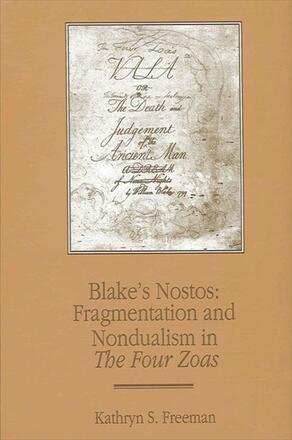
Blake's Nostos
Fragmentation and Nondualism in The Four Zoas
Alternative formats available from:
Establishes Blake’s controversial, unfinished epic, The Four Zoas, as the culmination of his mythos.
Description
Blake's Nostos establishes The Four Zoas, Blake's controversial, unfinished epic, as the culmination of the poet's mythos. Kathryn S. Freeman shows that, in its freedom to experiment with nontraditional narrative, this prophetic book is Blake's fullest representation of nondual vision as it coexists with the material world. Blake's scheme of consciousness eliminates the Enlightenment hierarchy of faculties in a structure centered around a nondual vision operating through and subsuming the fragmented world. The author draws on the analogue of Eastern philosophy to describe Blake's nondualism. According to this interpretation of Blake's epic, consciousness itself is the hero whose nostos is the apocalyptic return to wholeness from the multiple ruptures that comprise the fragmenting journey of Albion's dualistic dream. Blake's Nostos demonstrates that for each of the central elements of myth—causality, narratology, figuration, and teleology—Blake superimposes such dual and nondual perspectives as time and eternity as well as bounded space and infinity.
Kathryn S. Freeman is Assistant Professor of English at the University of Miami.
Reviews
"While many of Blake's critics resort to a vocabulary or a methodology that compounds the difficulties of understanding Blake's prophetic poetry, Freeman writes with clarity and precision. The topic, how Blake in The Four Zoas has challenged the fundamental dualism of Western thought with a nondualistic poetics of 'Contraries,' may seem often on the verge of losing its own philosophical ground and lapsing into paradox, but Freeman is able to build her case persuasively as she guides her reader through Blake's myth of the Fall into the constrained realm of temporal/spatial constructs. Without lapsing into the language of epiphany, she explains Blake's celebration of a liberating vortex. His vision, she convincingly argues, is not the rhapsodist's furor divinus, but is mediated in and through physical and mental awareness." — Frederick Burwick, University of California, Los Angeles